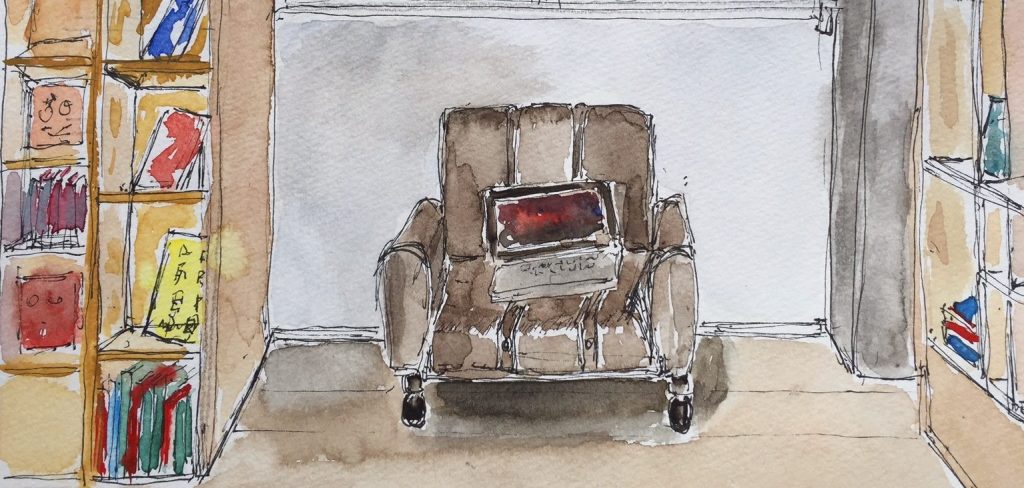Art; watercolour & ink, by Diana Green, artist and author.
Copyright Diana Green 2020.
Tokyo is a very easy city to travel around, whether walking or taking public transport. However, in an attempt to negotiate and survive the streets or the underground it has become a necessity to dodge or jump out of the way to avoid people as they rigidly stare at their smart-phone, empty of thought, as they blindly walk into others.
Commuters are often engrossed in playing games, anime, viewing maps and travel schedules. Large Tokyo railway stations make announcements in Japanese, English and Chinese not to use smart phones whilst walking, recommending people stop and move to the side of the walkway. We are loosing our ability to stop to smell the roses!
No doubt this has become a global phenomena!
Information Communication Technology supports and is integrated into our lifestyles. It influences the way we live. In this era of mobile digital communication, many of us would struggle without our smart phone, computer or tablet for work and play. We have a multitude of digital choices. All of these technologies are fantastic, quick, easy and effective methods for communicating and connecting with colleagues and friends around the globe.
As we rely on information communication technology, our increasing use is fast becoming an obsession, to a point that our behaviour is affected by continuously staring at our digital ‘icons’, in danger of being ‘Robotic’ or ‘Digital Zombies’ in our approach.
This has affected how we engage and communicate with others; our natural verbal face-to-face conversations, to be intimate, our ability to constructively be alone in keeping ourselves company, to trust our intuition and interpret to make meaning, to openly engage in work and play with others.
Do we really need to be plugged in 24 hours a day?
What are the consequences?
As we evolve into the 21st Century and beyond, the intensive use of digital information communication technology is affecting the quality of life, our thinking, our verbal communications and our brain wiring.
Sherry Turkle, author of Reclaiming Conversations: The Power of Talk in a Digital Age, explores the question of what is happening to our way of life?
Are we in danger of losing verbal face-to-face communication? In particular, how children who have never lived without digital technology are losing the skill to practice empathy; make eye contact, to listen, to enquire of others. In a Google talk, she states “Technology makes us forget what we know about life”.
As technology advances we are in danger of diluting our instinct to intelligently and wisely engage with others. It is a concern that if we continue to be driven by technology, then we will become overly reliant. We risk losing our ability to be the directors of when and where we use technology.
Why is this important now?
According to Thomas L Friedman’s in his 2016 book, Thank You for Being Late. “… technology is increasing at an ever faster rate while human adaptability rises only at a slower, rate.” He asks, “how do we lift the human adaption line to meet technology where it is?”
This raises questions. Are we becoming the endangered species as our ‘human-ness, our curiosity and motivation to discover is threatened? Are humans in flux, reacting as they run to keep up with technological advancement? Are we living with constant destructive, distractive influences encouraging us to react to the consistent technological stimulus coming at us?
Richard Hill, author of How the ‘real world’ Is Driving Us Crazy!, explains that with our accelerated life style and constant demand, our brain is over stimulated and we are struggling to engage the subtlety of the subconscious mind. When we spend too much time in a hectic state of mind, how are we able to notice what matters? The “noise” of the world and how we think about it interrupts and “over powers” the intuitive within us.
It is not a question of how to lift the human adaption line to meet technology, but a choice to do things differently, beyond the hectic state of mind, to be present; to notice to stop, to listen, to hear, to find voice, to relax and to surrender old patterns and habits of behaviour.
In presence our awareness is raised, the subconscious mind is re-awakened. When we are aware, at each moment, we are life-long learners and compassionate creative leaders who ‘master our human technology’, our inner natural guidance, to be present.
It is up to each one of us.
Ultimately, when we finally look up to smell the roses, will we have lost our sense of smell?
by Diana Green August 2018
Ref: Sherry Turkel, Reclaiming Conversations: The Power of Talk in a Digital Age.
Thomas L Friedman, Thank You for Being Late.
Richard Hill, How the ‘real world’ Is Driving Us Crazy!


